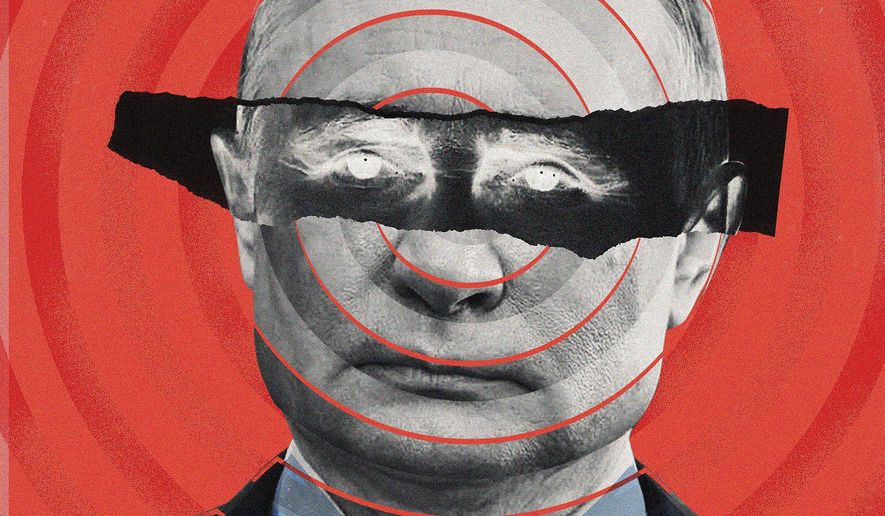OPINION:
Liberals believe that a decision to make war is unthinkable, unfathomable and, thus, irrational. Wars, they think, happen by accident, not intent, unless the person deciding to go to war is insane. Thus, the media is peddling a narrative that Russian President Vladimir Putin is crazy.
To label Mr. Putin insane is too facile, too convenient and probably wrong.
There is considerable evidence that Mr. Putin has changed over the years. But, as we’ll see in a moment, that evidence doesn’t prove he’s gone crazy.
The decision to make war, as history informs us, is frequently both rational and logical. The Americans who stood against the British in 1775 at Lexington and Concord were perfectly sane and courageous as were the Hungarians who rebelled against Soviet domination in 1956. Three centuries of British, French and Spanish colonialism, while indefensible today, was a rational pursuit of riches and empire.
Wars can also result from leaders’ paranoia or stupidity. Germany’s Kaiser Wilhelm II — who was, as even his royal cousins thought, not very smart — believed his nation was surrounded by alliances intent on destroying it. Germany’s “Schlieffen Plan,” in development since 1899, was for a carefully-orchestrated mobilization followed by invasions of Belgium and France. When the Kaiser ordered the mobilization in August 1914, he decided to make war.
The case against Mr. Putin’s sanity is in several parts. Some, such as former Secretary of State Condoleezza Rice, believe his recent conduct proves he has become erratic. Others point to Mr. Putin’s Feb. 22 rambling, angry speech and his public criticism of Sergei Naryshkin, his foreign intelligence service director, as evidence of Mr. Putin’s having turned a psychological corner.
How much has Mr. Putin changed and how suddenly? He has, throughout his career in the KGB and in politics, always been ruthless, coldly calculating and, frankly, evil, as Masha Gessen demonstrated in her 2012 book, “The Man Without a Face.” He carefully projects a tough-guy image. But at 69 years of age — 10 years younger than President Biden — has Mr. Putin lost his grip on reality?
In Walter Laqueur’s 2015 book “Putinism,” he describes it as an autocracy mitigated by inefficiency and corruption, as “state capitalism” with liberal economic policy and a small but mostly free press. Events have proven that description is mostly true though Russian media is heavily state-controlled. What is entirely clear is that Mr. Putin is in complete control of a government comprised of his “siloviki,” men who have, as he did, served in Russia’s intelligence agencies.
It is these men on whom Mr. Putin relies and even they have difficulty getting to see their steadily more isolated boss. Mr. Putin, we are told, is a germophobe, not letting even his most trusted advisers into the room unless they are tested for COVID-19 and sit about 10 feet away from him. He is rumored to suffer from Parkinson’s disease. One British newspaper said Mr. Putin was an old man spending most of his time alone stewing in his own fears. Some are theorizing that he suffers delusions and confusion after a long bout with COVID-19.
Many of those who are pushing the “crazy Putin” narrative point to his putting Russia’s nuclear forces on alert, and his implied threat to use nuclear weapons if any NATO nation interfered in Ukraine. Using nuclear weapons would be the act of a madman but threats of nuclear war were standard Soviet rhetoric during the Cold War. Mr. Putin’s implied nuclear threat was a bullying tactic, not proof of insanity.
Mr. Putin had, several times before the Ukraine invasion, railed against the possibility that Ukraine could become a NATO member. He said that inviting Ukraine to join NATO would cross a red line and that NATO’s stationing “strike systems” there would cross another.
In mid-December, Mr. Putin made specific demands on NATO. First among them was a legal guarantee that Ukraine would never become a member. Second was the demand for withdrawal of NATO troops from Poland and from the Baltic states of Estonia, Latvia and Lithuania, which were once in the Warsaw Pact. NATO General Secretary Jens Stoltenberg quickly rejected those demands.
The “crazy Putin” narrative is almost certainly false. But we cannot doubt Mr. Putin’s paranoia over NATO’s proximity to Russia and its member states who used to be Soviet satellites. It is not unfair to compare Mr. Putin’s state of mind today to Kaiser Wilhelm’s in 1914 with the caveat that Mr. Putin is far more intelligent.
In 2008, Mr. Putin decided to conquer and annex the Crimean peninsula which was a part of Ukraine. Because Russia’s Black Sea fleet is headquartered in Sevastopol, Mr. Putin’s seizure of Crimea was a rational action.
Mr. Putin’s war to conquer Ukraine raises another question. The conduct of Russian forces has been horrific. Ukrainian President Zelenskyy has accused Russia of war crimes because civilians have reportedly been targeted intentionally and repeatedly. The question we should be asking is not whether Mr. Putin is insane but if he is a war criminal.
Mr. Biden should personally address the U.N. Security Council and demand an investigation into whether Mr. Putin is guilty of war crimes. Mr. Putin should be an international pariah whether he’s sane or not.
• Jed Babbin, a deputy undersecretary of Defense in the George H.W. Bush administration, is the author of “In the Words of Our Enemies.”




Please read our comment policy before commenting.